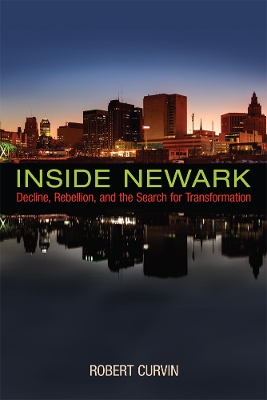Rivergate Regionals Collection
1 total work
For decades, leaders in Newark, New Jersey, have claimed their city is about to return to its vibrant past. How accurate is this prediction? Is Newark on the verge of revitalisation? Robert Curvin, who was one of New Jersey's outstanding civil rights leaders, examines the city, chronicling its history, politics and culture. Throughout the pages of Inside Newark, Curvin approaches his story both as an insider who is rooting for Newark and as an objective social scientist illuminating the causes and effects of sweeping changes in the city.
Based on historical records and revealing interviews with over one hundred residents and officials, Inside Newark traces Newark's history from the 1950s, when the city was a thriving industrial centre, to the era of Mayor Cory Booker. Along the way, Curvin covers the disturbances of July 1967, called a riot by the media and a rebellion by residents; the administration of Kenneth Gibson, the first black mayor of a large northeastern city; and the era of Sharpe James, who was found guilty of corruption. Curvin examines damaging housing and mortgage policies, the state takeover of the failing school system, the persistence of corruption and patronage, Newark's shifting ethnic and racial composition, positive developments in housing and business complexes and the reign of ambitious mayor Cory Booker.
Inside Newark reveals a central weakness that continues to plague Newark - that throughout this history, elected officials have not risen to the challenges they have faced. Curvin calls on those in positions of influence to work for the social and economic improvement of all groups and concludes with suggestions for change, focusing on education reform, civic participation, financial management, partnerships with agencies and business, improving Newark's City Council and limiting the term of the mayor. If Newark's leadership can encompass these changes, Newark will have a chance at a true turnaround.
Based on historical records and revealing interviews with over one hundred residents and officials, Inside Newark traces Newark's history from the 1950s, when the city was a thriving industrial centre, to the era of Mayor Cory Booker. Along the way, Curvin covers the disturbances of July 1967, called a riot by the media and a rebellion by residents; the administration of Kenneth Gibson, the first black mayor of a large northeastern city; and the era of Sharpe James, who was found guilty of corruption. Curvin examines damaging housing and mortgage policies, the state takeover of the failing school system, the persistence of corruption and patronage, Newark's shifting ethnic and racial composition, positive developments in housing and business complexes and the reign of ambitious mayor Cory Booker.
Inside Newark reveals a central weakness that continues to plague Newark - that throughout this history, elected officials have not risen to the challenges they have faced. Curvin calls on those in positions of influence to work for the social and economic improvement of all groups and concludes with suggestions for change, focusing on education reform, civic participation, financial management, partnerships with agencies and business, improving Newark's City Council and limiting the term of the mayor. If Newark's leadership can encompass these changes, Newark will have a chance at a true turnaround.
